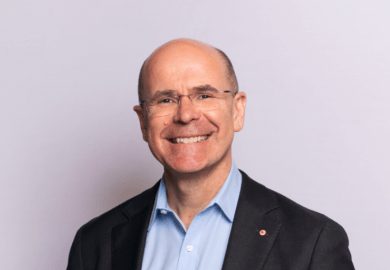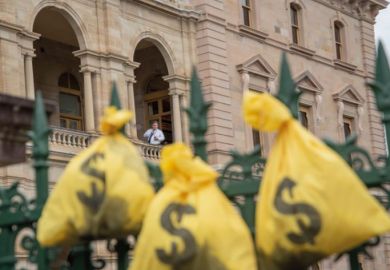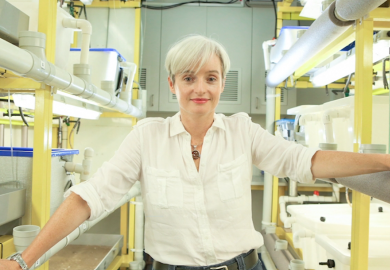A small Australian university, which is rationalising its programmes and reducing its workforce amid a “scary” financial crisis, has refused to say why it agreed to the executive entitlements that made its recently departed leader the most handsomely paid vice-chancellor in the country’s history.
The abrupt resignation of former University of Canberra (UC) vice-chancellor Paddy Nixon was announced in January. According to the institution’s annual report, Professor Nixon had left a month previously and received about A$1.785 million (£921,000) last year.
Professor Nixon, who said he had left for personal reasons and had 15 months remaining on his contract, has not answered media enquiries about his departure.
UC chancellor Lisa Paul said Professor Nixon had been paid “as per contractual arrangements” that had been “confidentially negotiated with the university council”.
In an August “town hall” meeting, UC staff were told that the institution faced a 2024 deficit of between A$33 million and A$36 million – around A$9 million more than the A$26 million deficit “reluctantly” approved by the council – despite “extraordinary” savings achieved this year.
“Those savings were…not without consequences,” interim vice-chancellor Lucy Johnston told the meeting. “Things that we had wanted to do we were unable to do. People have taken on additional tasks where we haven’t been able to backfill positions or hire additional sessional or casual staff.”
The university has imposed new restrictions on travel, recruitment and capital works after some A$12 million in savings from delayed recruitment, reduced staff spending and other cuts proved insufficient.
It is considering “adjustments” to the “organisational profile” and “divestment in weaker or non-strategic areas”, according to a confidential document circulated in May. New initiatives, dubbed “transformation sprints”, include an inventory of courses with few enrolments.
Professor Johnston said the university was trying to put off obtaining a bank loan for as long as possible. “The longer we can delay [that], the better it is for repayment, for interest, for our operating margins,” she told the August meeting, adding that the university risked exhausting its “approved borrowing limit” in 2025. “It is a scary prospect that we collectively have to address. At the moment, our expenditure is approximately A$50 million more than our revenue.”
Times Higher Education asked why the university had agreed to generous executive entitlements in such a fiscal environment, and whether jobs and courses might have been saved if Professor Nixon’s pay had been lower. The university said it had “no further comment on vice-chancellor remuneration”, but said visa changes, cost-of-living pressures and a strong labour market had weakened the sector’s earnings.
“The University of Canberra continues to review short-, medium- and long-term savings options [and] communicate with staff regarding approaches to ensure…financial sustainability,” a spokesman said.
Professor Johnston was asked during the August meeting whether UC would reduce remuneration for the next vice-chancellor, given the revenue problems. “It’s a council process, but…the council is very aware of the financial situation of the university and sector and will be factoring that in,” she said. “I can assure everyone that the interim vice-chancellor’s salary is significantly lower than that which you have seen bandied around in media.”
Ms Paul told the AFR Higher Education Summit in August that vice-chancellors’ salaries were one of the factors behind a decline in public confidence in universities. “I don’t think we’ve lost social licence…but we’ve definitely lost some public confidence. If we could increase public confidence, then the policymakers will have a different perspective.”
Register to continue
Why register?
- Registration is free and only takes a moment
- Once registered, you can read 3 articles a month
- Sign up for our newsletter
Subscribe
Or subscribe for unlimited access to:
- Unlimited access to news, views, insights & reviews
- Digital editions
- Digital access to THE’s university and college rankings analysis
Already registered or a current subscriber?









